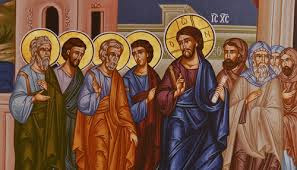In today’s Gospel reading, Jesus directly appeals to the works He is doing as a means of validating His very nature and message. The trouble with the reasoning of Jesus’ opponents here is that they were in fact stoning Him for good work. All of Jesus’ signs and wonders (e.g. miracles) were done in the context of His claims as the unique Son of God inaugurating the Kingdom of God. The works and the man (the God-man) could not be separated. As the man who was healed of blindness in John 9 says, no one could do such a wondrous thing if God were not with Him. Jesus’ claiming equality in conjunction with the works He did - that could only be with and through God - means that His opponents were in fact trying to kill Him for the works that He did. Thus, they were directly opposing God in the most base, violent way.
To oppose God by violence goes back at least to Cain. The human soul becomes so bent and twisted by sin that it lashes out. Cain demanded God conform to his offering and slays his brother when he cannot control his jealousy. Cain lashes out at God by attacking the image bearer of God. And so it goes from that time until now.
When He quotes Psalm 82, Jesus reminds His opponents, who accepted the full revelation of the Psalms, that they were put here as representatives and agents of God. This is sometimes called a vice regency. Being made in the image of God, per Genesis 1:26-27, means that man has a unique purpose in representing God on earth. Hence, the directives to stewardship and fruitfulness.
Man cannot create per se as God does, but man does share an important part in bringing into existence rational creatures via procreation. Man also shapes and forms what God has brought into being. Being endowed with intellect and will, man is unique among terrestrial creatures. Having these capacities, and having been given the very words of God in the Scriptures to remove ambiguity, there should be no doubt that the creative and regenerative power of God, something not given to men, was on plain display in front of them. The agent should be able to recognize the role of the principal, to know when they are ‘in their lane’ as it were, and when the principal is acting in their capacity. The works of Jesus and the response make plain man’s de facto repudiation of the agency he was endowed with. The agent becomes self-determining, no longer responsible to the principal.
We should see a connection between today’s passage and the parable of the tenants. When man loves himself more than God, violence is close at hand. Violence is the default answer when we cannot get God to be made in our image. This gloomy part of our existence should make us all the more glad that the Lord Jesus came to rescue us from it.

No comments:
Post a Comment